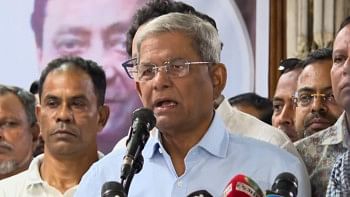Syed Mahbub Murshed: Remembering a legend
Justice Murhsed through out his life remained the champion of the body politic. Justice Abu Sayed Chowdhury wrote about him stating that “Justice Murshed in his judgments reached correct decisions indicating the boldness of his mind. He gained fame for his wisdom and intelligence, as well as deep respect of the public as he was fearless. It was Justice Murshed, the man, who had for many years, with courage dauntlessly upheld the rule of law and had administered justice without fear or favor, despite severe pressure.”
During the Bengal famine in 1943 and later during the communal riots of 1946, Murshed worked actively with the Anjuman Mafidul Islam. Again during the communal violence in 1947 that shook the subcontinent, he was one of those who had initiated the process of settling issues peacefully which culminated in the Nehru-Liaquat pact. He was drawn into the vortex of the language movement in the early fifties.
In the later part of 1954, he was elevated to the bench of the Dhaka High Court. As a judge Syed Mahbub Murshed remained committed to his lifelong ideals of liberty, justice and excellence. His judicial pronouncements, delivered while sitting in the bench of the Dhaka High Court and Supreme Court of Pakistan briefly as an ad-hoc judge plus as Chief Justice reflected his ideals. Some of his judgments created constitutional history and won for him, international acclaim.
In addition to his judicial work he also championed Bengali cultural freedom, particularly, during the oppressive Ayub regime. In 1961, he organised the Tagore centennial celebrations. Further, Jutice Murshed's important role in the mass upsurge of 1969 and his refusal to collaborate with the Pakistani military regime in 1971, during our liberation struggle will be hailed by the history.
Another significant contribution by Chief Justice Murshed was that he gave the final varnish to the drafting of the six points. It was Justice Murshed as a practicing lawyer in early 1954, who was among those who drafted the 21 point manifesto of the Jukta-Front government.
During the round-conference in 1969 and when Ayub was virtually surrendering to the opposition and additionally, with the dissolution of the one unit in West Pakistan, Justice Murshed demanded one man one vote. Prior to this new demand, there was parity of 150 seats each for East and West Pakistan in the then Pakistan National Assembly. However, it was when Justice Murshed's proposal was accepted, the one man one vote concept resulted in 169 seats for East Pakistan out of 300. In other words, it was Justice Murshed who paved the way as to whoever would be the majority in the East Pakistan, they would obviously form the National government.
In conclusion to quote Dr Mizanur Rahman Shelly, Murshed was the man in his life span who was endeavoring in "building bridges between the past, present and future."
The writer is a practicing lawyer with chambers at London and a researcher on late Justice Murshed.

 For all latest news, follow The Daily Star's Google News channel.
For all latest news, follow The Daily Star's Google News channel. 



Comments